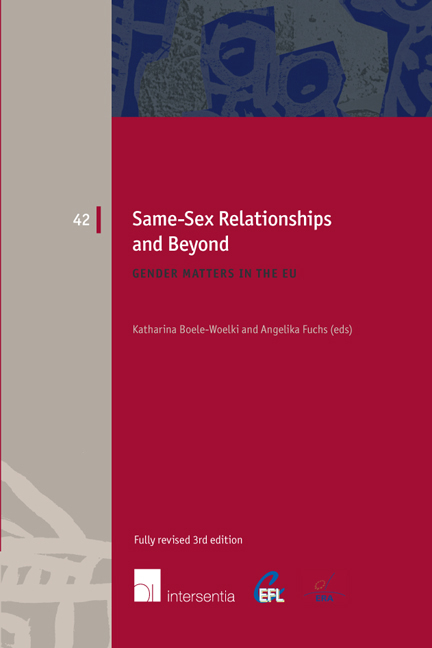Book contents
- Frontmatter
- Preface
- Contents
- List of Authors
- Part I Formalising a Same-Sex Relationship: Marriage and Partnership
- Part II Parenthood and Children's Rights
- Parenthood for Same-Sex Couples in the European Union: Key Challenges
- Recent Case Law on Cross-Border Surrogacy
- Law and Practice of Intercountry Adoption
- Part III Gender Identity and Human Rights
- EUROPEAN FAMILY LAW SERIES
Parenthood for Same-Sex Couples in the European Union: Key Challenges
from Part II - Parenthood and Children's Rights
Published online by Cambridge University Press: 29 September 2018
- Frontmatter
- Preface
- Contents
- List of Authors
- Part I Formalising a Same-Sex Relationship: Marriage and Partnership
- Part II Parenthood and Children's Rights
- Parenthood for Same-Sex Couples in the European Union: Key Challenges
- Recent Case Law on Cross-Border Surrogacy
- Law and Practice of Intercountry Adoption
- Part III Gender Identity and Human Rights
- EUROPEAN FAMILY LAW SERIES
Summary
EUROPEAN COURT OF HUMAN RIGHTS ’ GROUND RULES ‘
SAME-SEX COUPLES: AN OBLIGATION TO LEGALLY RECOGNISE UNION, BUT NO OBLIGATION TO GRANT ACCESS TO MARRIAGE
European Court of Human Rights (ECtHR) jurisprudence provides several EU-wide ‘ground rules’ for variable levels of parenting rights for same-sex couples across the EU. However, in 2010, the Court drew a line in the sand in the case of Schalk and Kopf v. Austria in finding that there was no obligation for a Member State to grant same-sex couples access to marriage. The Court has reiterated this position on two occasions since: in Gas and Dubois v. France, and in X v. Austria. This baseline has now been entrenched: there appears to be no suggestion on the horizon of the ECtHR imposing a positive obligation on Member States to recognise same-sex marriage.
By contrast the horizon for same-sex parenthood outside marriage is brighter. In Vallianatos and others v. Greece, in the absence of any domestic recognition of same-sex union, Greece had taken the unusual step of creating a civil partnership scheme, but reserving it to heterosexual couples only. The Court found the measure to be directly discriminatory and a violation of Articles 8 and 14 of the European Convention on Human Rights (ECHR), although at that stage did not suggest a positive obligation to provide for domestic legal recognition of same-sex union. However, in 2015, the court went a step further and put down another marker in Oliari and others v. Italy. The Court found that the absence of any legal framework or regime providing for the recognition and protection of same-sex unions is a breach of Articles 8 and 14.
The current position is thus that there is no obligation on Member States to grant same-sex couples access to marriage, but there is an obligation to implement some framework for the recognition of same-sex union.
DIRECT DISCRIMINATION UNACCEPTABLE, BUT NO OBLIGATION TO PROTECT AGAINST INDIRECT DISCRIMINATORY OUTCOME
In Gas and Dubois v. France, the Court found that a regime that reserved parenting rights to married couples was not a breach of Articles 8 and 14 ECHR, despite the fact that this had an indirectly discriminatory effect on same-sex couples, who at the time had no access to marriage rights.
- Type
- Chapter
- Information
- Same-Sex Relationships and BeyondGender Matters in the EU, pp. 79 - 122Publisher: IntersentiaPrint publication year: 2017



